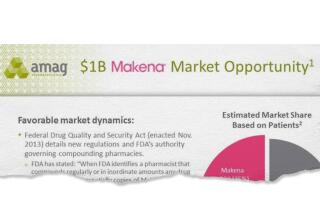FDA approves the first drug designed to treat postpartum depression
- Share via
The Food and Drug Administration on Tuesday approved the first drug specifically for postpartum depression, a debilitating condition that affects about 400,000 women a year in the United States.
The disorder, which begins during pregnancy or within a month of childbirth, is far more severe than the common “baby blues.” It is characterized by feelings of worthlessness or guilt, or thoughts of suicide, and can interfere with a mother’s ability to bond with an infant, which can affect the baby’s development.
The newly approved drug, called brexanolone, will be marketed under the name Zulresso. Its manufacturer, Sage Therapeutics in Cambridge, Mass., said the drug would probably cost $20,000 to $35,000 for a course of treatment.
Whether the treatment gets covered by insurance is determined by each insurance company, which also sets the out-of-pocket costs, depending on the plan.
The medication must be administered intravenously for 60 continuous hours. An FDA safety program that accompanied its approval requires that the drug be given under the supervision of a healthcare professional, in a doctor’s office or a clinic, for example.
The complicated treatment protocol — and high cost — appears to be reflected in Sage’s fairly modest sales expectations, about $100 million during its first full year on the market. The drug is expected to be available in June.
Experts called the drug a major advance for a serious illness that does not get enough attention.
“We don’t have any treatments that are anywhere near this effective,” said Dr. Jess Fiedorowicz, a psychiatrist at the University of Iowa and a member of an FDA advisory panel that recommended agency approval of the drug. “So this is groundbreaking in that regard.”
Women diagnosed with postpartum depression currently are treated with antidepressants and psychotherapy, but the drugs take four to eight weeks to be fully effective and generally have only a small to moderate effect. The new drug, by contrast, takes effect quickly and lasts at least 30 days, according to clinical studies.
Still, Fiedorowicz said, the cost and method of administration could prevent women from getting it.
Dr. Samantha Meltzer-Brody, a psychiatrist at the University of North Carolina who led the clinical trials for the drug, said the medication is such an improvement over current therapies that she doubts the IV administration will discourage its use.
She noted postpartum depression, one of the most common complications of childbirth, is “under-diagnosed and neglected,” and that suicide is a major cause of maternal death.
“For women suffering, you can say, ‘You can come in and be treated and in 2.5 days it can go away, and not come back,’ ” she said.
The main component of the drug is allopregnanolone, “a breakdown product” of the hormone progesterone that affects the GABA neurotransmitters, which have a role in mood regulation, Meltzer-Brody said. Its exact mechanism of action is unknown.
Sage is developing another drug to treat postpartum depression and major depressive disorder that would be administered as a once-daily pill. The medication recently showed good results in a Phase 3 clinical trial. If approved, it could be a blockbuster, some industry analysts say.
The FDA’s advisory committee recommended approval of brexanolone in early November, but the agency delayed the green light to evaluate a safety concern: A small number of women who received the drug lost consciousness.
That problem is easily solved by lowering the dose, Meltzer-Brody said. But it is the reason why the agency is requiring that the drug be given under the supervision of a health professional.
Dr. Anna Glezer, a psychiatrist at UC San Francisco, said she was encouraged to see an entirely new approach to medication for depression and, in particular, a product aimed specifically at women’s mental health.
She said mild to moderate cases can be missed because the fatigue and sleeplessness that accompany the arrival of a new baby are also some of the physical symptoms of depression.
Given the way the drug will be administered, Glezer said she expected it to be used mainly on the most severe cases, especially women whose postpartum depression requires hospitalization.
The approval is the second important one involving depression this year. Earlier this month, in the biggest advance for depression in years, the FDA approved esketamine, also called Spravato, for people with major depression who have not responded to other treatments.
The Associated Press and Bloomberg contributed to this report.






